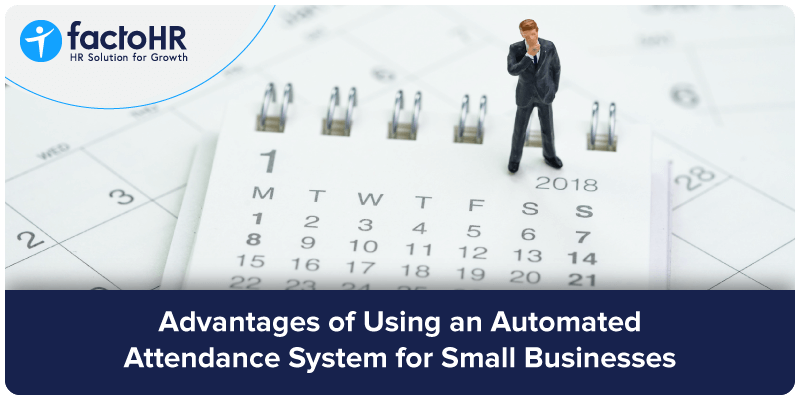Advantages of Using an Automated Attendance System for Small Businesses

Table of Contents
Small businesses have a lot of overheads to cover as well as spend on technology to ensure their core business is adequately supported. There is increased spending also to ensure the security of their data and infrastructure. Given this background, it is prudent to automate some processes to improve efficiency and remove manual work. The savings can be directed toward higher-priority tasks or core business activities.
Manually marking attendance, accounting for leaves and ensuring the data is accurate is a painstakingly long and tedious process every month. HR teams, managers, and employees need to spend quite a bit of time on this process.

Benefits of Automating Attendance Tracking
Investing in a system for marking attendance might seem like an additional cost initially. However, the benefits far outweigh the cost in the long term. Some benefits of an automated attendance management system are:
Increased Accuracy
Automated attendance tracking systems can be highly accurate, reducing errors and ensuring that attendance records are accurate. This ensures that the processes like payroll and leave management, which depend on accurate attendance data, are run without any glitches and need for additional corrections to be made to the data.
Time-saving
Traditionally, attendance data is input by the employees either in a physical register or in an enterprise application. That required verification by managers and approving them. HR teams then had to verify that data against employee leave data – either from another app or physical records. Once the data is verified and corrected where necessary, it is uploaded to payroll processing and any other HR system that uses the data. Doing all this processing usually meant that a considerable effort is spent and sometimes delayed the payroll processing. Automating the attendance tracking process saves a lot of time for various departments and the employees as well. Hence, they get more time to work on their own important tasks.
Cost-effective
As discussed above, a lot of time and effort needs to be spent on collecting attendance data manually and ensuring its accuracy. This directly translates to labour costs. Automation can reduce labour costs associated with manual tracking methods. Any additional investment made to procure an attendance management system can be fully recovered within a short period.
Better Data Analysis
Companies look to improve productivity when they make investments in enterprise systems. One of the major benefits of using an automated system to generate attendance data is that the captured data is accurate and detailed. Using such attendance records, companies can analyse attendance patterns and trends to improve employee productivity and performance. This type of analysis will also benefit future planning and more accurate effort and cost estimations for new projects.
Remote Work and Flexible Schedule
With the changes prompted by the COVID-19 pandemic, more employees are opting for remote work without affecting productivity. Employees enjoy better work-life balance as the commute times are saved. In such scenarios, automated attendance tracking systems can be used to track attendance for remote and flexible work arrangements.
Compliance
Labour laws in many countries stipulate maximum working hours per week and mandatory holidays per year for an individual who is employed with an organisation. Accurate and real-time data collected by automated systems can help companies comply with such legal requirements for tracking employee attendance and working hours.
Increased Security
Physical security for office premises is a key aspect, especially for small companies that work in niche areas. Protecting their intellectual property is paramount as the entire business depends on it. The risk of an intruder entering the premises and stealing a laptop containing sensitive information is daunting. So, any additional security is always welcome. Biometric authentication and facial recognition can provide a layer of security and can prevent buddy punching or tailgating by intruders.
Convenience
Employees can check-in or check-out from anywhere as long as they have access to the system, this can be done via a mobile app. Depending on the method used for collecting attendance information, the employee may not even be required to do anything specific like when using Bluetooth and NFC(Near Field Communication). The system simply collects the data as per preset triggers and rules. In other cases, they can simply open the app and punch in or out.
Improved Employee Experience
Enabling an automated and convenient way of managing attendance enhances employee experience. They feel confident that their work hours and time-off are accurately captured. They can even check available leave and plan their holidays from the comfort of their mobile phone app at their convenience. Employees recognise that their time is valued as unnecessary manual work is eliminated. With accurate records, payroll will always be accurate and timely. Employees appreciate the recognition for their work and receiving their salary accurately and timely.

Conclusion
All businesses benefit from automation and removing manual effort-intrinsic and cumbersome processes. Small businesses are even more so due to their limited funding and bandwidth. It makes for a good business case to invest in an automated attendance tracking system that will ensure a good return on investment in a short period of time.
Grow your business with factoHR today
Focus on the significant decision-making tasks, transfer all your common repetitive HR tasks to factoHR and see the things falling into their place.

© 2026 Copyright factoHR


